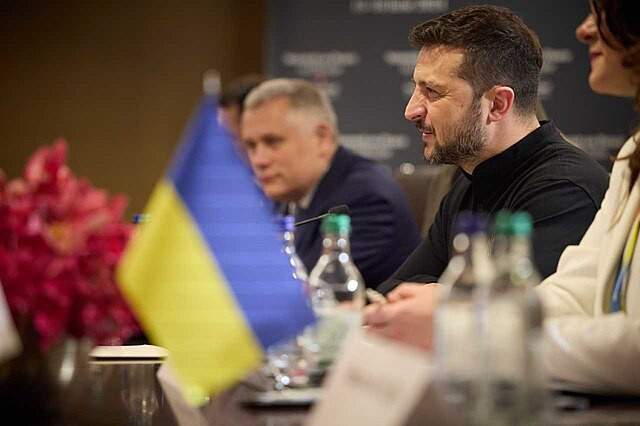Ukrainian officials confirmed Sunday that they have not been invited to the upcoming U.S.-Russia peace talks set to take place in Saudi Arabia, raising concerns that Kyiv could be left out of negotiations determining the country's future. The talks, which mark the first direct U.S.-Russia discussions on ending the nearly three-year war in Ukraine, are being led by U.S. Secretary of State Marco Rubio, National Security Advisor Mike Waltz, and White House Middle East envoy Steve Witkoff. The meeting follows a phone call last week between President Donald Trump and Russian President Vladimir Putin, which ended a years-long freeze in high-level diplomatic contact between the two nations.
Ukraine's President Volodymyr Zelensky has repeatedly insisted that no agreement about Ukraine can be made without Ukrainian participation. He would ”never accept any decisions between the United States and Russia about Ukraine, never," he said in an interview with NBC on Sunday. Ukrainian officials also emphasized that they had not been included in the Saudi talks and that they would not engage in any direct negotiations with Russia until a coordinated strategy was developed with Western allies.
European leaders have also been left out of the talks, prompting French President Emmanuel Macron to hastily organize a summit in Paris on Monday with UK Prime Minister Keir Starmer, German Chancellor Olaf Scholz, and NATO Secretary-General Mark Rutte. The European Union has expressed frustration over Trump's unilateral approach, with EU officials warning that if they do not present their own strategy soon, they risk being frozen out of any potential peace settlement.
Rubio, who is spearheading the U.S. delegation to Saudi Arabia, has downplayed expectations, stating that this initial meeting would not be a final solution but rather the first step in a longer negotiating process. He told CBS News that the coming days would determine whether Putin is "serious about achieving peace." However, Trump has already indicated that he does not believe Ukraine will be able to regain all of its pre-2014 borders and has dismissed the possibility of the country joining NATO, both of which are central demands from Kyiv.
The exclusion of Ukraine and European leaders from the U.S.-Russia negotiations has sparked fears that Washington may be making early concessions to Moscow. Trump's Secretary of Defense Pete Hegseth has signaled a shift in U.S. policy, stating that European nations must provide the "overwhelming" share of funding for Ukraine, adding that the U.S. would no longer "tolerate an imbalanced relationship" with its allies. U.S. Vice President JD Vance echoed this stance at the Munich Security Conference on Friday, urging Europe to "step up in a big way" to fund its own defense.
Meanwhile, the war on the ground has continued to escalate. Zelensky reported Sunday that Russian forces had launched a drone strike on critical infrastructure in Mykolaiv, leaving at least 100,000 people without power. Russia has intensified its aerial bombardment in recent days, with Ukraine's military reporting a sharp increase in the number of missile and drone attacks. According to Zelensky, Moscow launched over 1,220 aerial bombs, 850 drones, and 40 missiles in the past week, compared to 1,206 bombs, 750 drones, and 10 missiles the previous week.
Amid these developments, Ukrainian officials remain skeptical about the Saudi talks. Mykhailo Podolyak, a top adviser to Zelensky, told Ukrainian television on Saturday that there was "nothing on the negotiating table that would be worth discussing." Andriy Yermak, another senior Ukrainian official, reiterated that Kyiv would not engage in direct talks with Moscow until a concrete plan for a "just peace" was developed in coordination with its Western allies.
The Kremlin, meanwhile, has reacted positively to Trump's push for negotiations, with Russian state media portraying the shift as a victory for Moscow. The Trump administration's decision to engage in direct talks with Putin marks a dramatic reversal from the previous U.S. policy of isolating Russia over its invasion of Ukraine. The Kremlin has not specified what its negotiating position will be, but Moscow has long insisted that Ukraine must formally recognize Russia's control over Crimea and the occupied territories in eastern Ukraine.
Witkoff, speaking on Fox News on Sunday, sidestepped questions about whether Ukraine would be forced to give up territory as part of a settlement. "Those are details, and I'm not dismissive of the details, they're important," he said. "But I think the beginning here is trust-building. It's getting everybody to understand that this war does not belong continuing, that it should end. That's what the president has directed us to do."
A Ukrainian delegation is currently in Saudi Arabia for separate economic discussions, though officials have not confirmed whether Zelensky himself will travel to the region. Ukrainian Economy Minister Yulia Svyrydenko has said the delegation is focused on strengthening economic ties rather than discussing peace talks. However, her comments came just hours after Witkoff confirmed that high-level U.S.-Russia discussions were set to begin in Riyadh.






